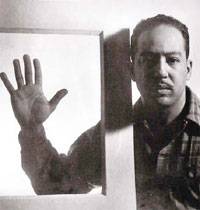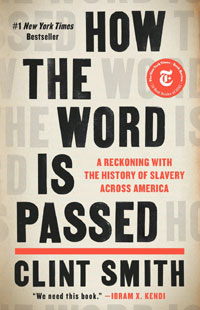|
For many years, the Steiny Road Poet taught a poetry workshop in the Arlington, Virginia elementary
schools that she called "Virginia History as Subject for Poetry." In that workshop, Steiny discussed Thomas Jefferson and Langston Hughes' poem "Freedom's Plow." The
course which reached many fourth and fifth graders was very popular because the students knew a lot about Jefferson and many of the students had visited Jefferson's home
Monticello. Steiny was able to get the students raising their hands to answer questions about Jefferson and what he wrote. Then she would get six to eight students to
read Langston's long poem about slaves coming to America to plough the land and how the poet had his audience consider what Jefferson wrote in the Declaration of
Independence.
Looking back on this workshop, Steiny sees she was planting seeds that would hopefully make these students question what they were taught
about American history. Here's an excerpt from "Freedom's Plow" that speaks to the issue of race before anyone knew about critical race theory (CRT), which now is a
controversial topic in southern schools.
A long time ago, but not too long ago, a man said:
ALL MEN ARE CREATED EQUAL—
ENDOWED BY THEIR CREATOR
WITH CERTAIN UNALIENABLE RIGHTS—
AMONG THESE LIFE, LIBERTY
AND THE PURSUIT OF HAPPINESS.
His name was Jefferson. There were slaves then,
But in their hearts the slaves believed him, too,
And silently too for granted
That what he said was also meant for them.
(excerpt from "Freedom's Plow" by Langston Hughes)

In 2021, a Black poet named Clint Smith (author of the poetry collection Counting Descent, published by Write Bloody Publishing, 2016) had his
book How the Word Is Passed: A Reckoning with the History of Slavery across America recognized as a New York Times bestseller. This is one of
those books that needs to be assigned to American teenagers and their parents as well.

As a white person of immigrant grand- and great grand-parents, Steiny has
been reading the stories and literature of Black authors since she was a teenager—such books as The Autobiography of Malcolm X, Ralph Ellison's The Invisible Man, The Black Poets edited by Dudley Randall. However,
what Clint Smith reports in How the Word Is Passed opens an underworld of facts and nuances that have been hiding in plain sight since Black people
were brought (against their will) to the land we know today as the United States of America.

How the Word Is Passed combines personal memoire with history and
tourism as the author travels from location to location to hear for himself what tourists are being told about the history associated with a particular
site and how that affects him, his ancestors, and the visitors to that site. Smith's first destination is Jefferson's home which he labels "Monticello
Plantation." Steiny stops right here because this is a blatant instance of what has been hiding in plain sight. Since Jefferson's estate became a
tourist destination in 1923 mostly for white people, it has been known simply as Monticello, with no mention of it having been a plantation. Even
now, the website is labeled: The Jefferson Monticello.

While Steiny, who has visited Monticello, knows Jefferson owned slaves
and had children by Sally Hemmings, a slave he owned, Steiny had not fully integrated those facts into her thinking about Jefferson as she was
teaching Virginia elementary school students. That is, until Smith described the tours he took at Monticello. One of them being the tour
focused on slavery. Furthermore, Smith makes it clear that Sally Hemmings was the half-sister of Jefferson's late wife, that all six of her
children were also Jefferson's children, that he paid them no fatherly attention, that, at his death, he freed only two of the four living offspring,
and that he had a history of separating families he held as property. No photos of Sally Hemmings exist but a man who knew her said she was
handsome with straight black hair and white skin tone and that one of her sons had surely passed as white once he was freed.
Smith conducted numerous interviews with tour guides of and visitors to Monticello. The inside stories of the tour guides reveal community
associations that go back to Jefferson's ownership of slaves and the struggles that erupted in bringing out truthful accounts of this historic
estate. The bottom line is that some visitors were shocked at what they learned and others refused to hear it.
Other places that Smith visits and researches include the Whitney
Plantation in Wallace, Louisiana where the largest slave rebellion in US history occurred and how this was related to the Haitian Revolution and
the Louisiana Purchase; Angola Prison, the Louisiana State Penitentiary where convict leasing supplied low-priced (mostly Black) labor to nearby
plantations, businesses, and railroads post-Reconstruction; Blandford Cemetery in Petersburg, VA home to one of the largest mass graves of
Confederate soldiers and the more modern day rise of Confederate statuary; Galveston Island (Galveston, Texas) site of the unshakeable myth
upon which the celebration of Juneteenth occurred (the reading by Union general Gordon Granger two years past the federal issue of the
Emancipation Proclamation that slaves were free); New York City and the selling, financing, and insuring of slaves; and Gorée Island off the coast of
Dakar, Senegal, site that commemorates the center of the European slave trade that fed the Middle Passage of Africans sold to American plantation owners. Clint Smith's How the Word Is Passed gives physical location to all
the issues discussed around the Black Lives Matter movement as well as the importance of the contributions made by Africans brought into the
United States starting during the colonial period.
How the Word Is Passed is remarkable for its sensitivity to the people
discussed and encountered but also for its carefully chosen words. In many ways, Clint Smith is a mindful scientist in the tradition of Gertrude Stein.
While Smith doesn't quote his own poetry in How the Word Is Passed, he does make mention of his poetry and the poetry of others. Here is the title
poem from his book of poetry which gives gravity to how his touches of memoire work in How the Word Is Passed.
COUNTING DESCENT
My grandfather is a quarter century
older than his right to vote & two
decades younger than the President
who signed the paper that made it so
He married my grandmother when they
Were four years younger than I am now
& were twice as sure about each other
than I've ever been about most things.
They had six children separated by nine
years, three cities & one Mason Dixon
line; there were twice as many boys as girls
but half as many bedrooms as children
which most days didn't matter because poor
ain't poor unless you name it so & kids
prefer playing to counting so there was never
much time to wallow in anything but laughter.
My mother was the third oldest or the fourth
youngest depending on who you ask.
She was born on a federal holiday which my
grandmother was thankful for, said the Good
Lord only got one day off when he built
the world, so one day is all she needed too.
Mom says Dad was persistent, wouldn't give up
when he asked if he could take her down the street
to get some coffee which back then cost
two dollars less than it is now. Now my
mom is trying to stop drinking coffee but still
loves Pops, they've been married
for thirty-one years and have three kids
who are six years & 1,517 miles apart. My birth
took twelve hours & forty-three minutes
which is probably because my head
is five times too big. My mom said that my
head was big because I needed enough
room to read all the books in the library,
which seemed like infinity even though
I didn't really know what infinity meant
but I had heard my teacher say it once
when she talked about the universe
& books felt like the universe to me.
I was pretty good at math too, until about
fifth grade when they started putting numbers
& letters together which didn't make much sense.
My brother is seventy months younger
than me but is taller & knows more about
numbers so it doesn't always feel like this is true.
My sister is twenty-four years of loyal
& eight years of best friend. I am the oldest
of three but maybe the most naive, I still believe
we can build this world into something new,
some place where I can live past twenty-five
& it's not a cause for celebration because these days
I celebrate every breath, tried to start counting
them so I wouldn't take each one for granted.
I wish I could give my breath to the boys who
had theirs taken but I've stopped counting
because it feels like there are too many
boys & not enough breath to go around.
|